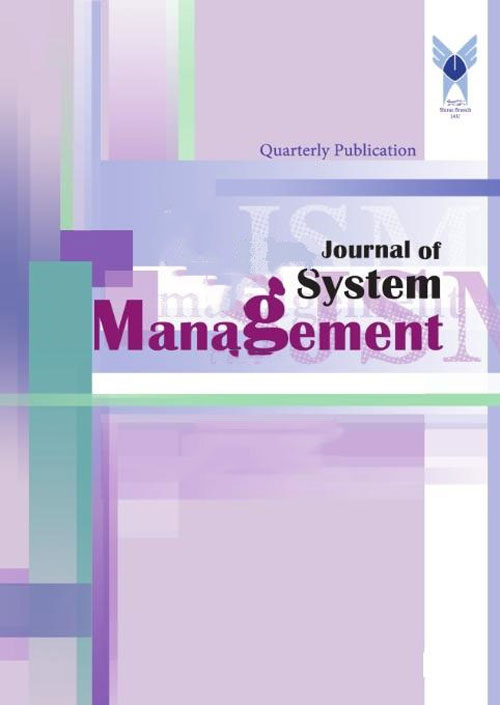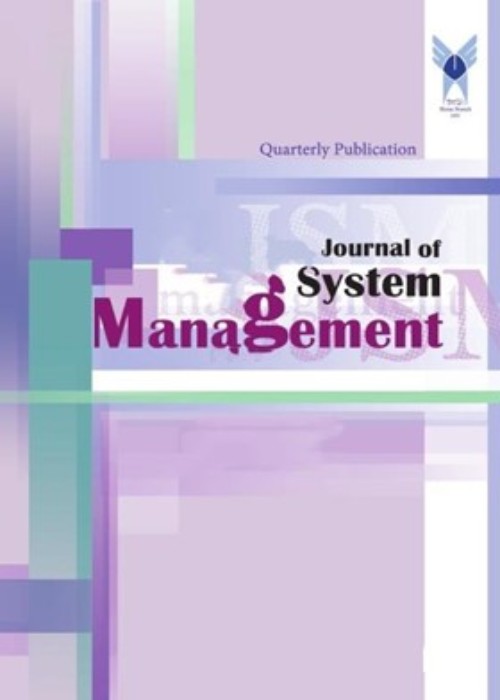فهرست مطالب

Journal of System Management
Volume:4 Issue: 4, Autumn 2018
- تاریخ انتشار: 1397/08/04
- تعداد عناوین: 6
-
-
Pages 1-12This research try to deal with Review the performance measurement in supply chain management (Case Study: IKCO, Iran) and the main question of the research has raised as following: what are the affective factors on performance measurement in supply chain management and how will their prioritization be based on Friedman's Test? The methodology of this research is a kind of applicable descriptive – survey. Statistical population of this research is 63 related managers, top experts and experts of IKCO. After choosing the sample size, validity of questionnaire was appraised by using Cronbach's alpha coefficient that it was efficient and useful. For examining the normality of data distribution of statistical group, Kolmogorov – Smirnoff test was used. Obtained results from examination of conceptual model of research and testing of its hypotheses showed that the distribution of data in statistical group is abnormal. Ranking of examined main factors in conceptual model was conducted on Friedman test. Then for examination of level of main effective factors t-test was used.Keywords: Performance Measurement, Supply Chain Management, IKCO
-
Pages 13-30Nowadays Iran’s position on the international corridors, the loss of Iran's roads accidents and the emergence of environmental and energy issues, have made the development of transportation in Iran a prerequisite. The purpose of this research is to identify the effective factors on the he high speed train technology transfer and provide t its framework. Data collection has been done with library and field studies. After these stages, from 73 extracted indicators, 54 main indicators were selected by the experts of the rail transportation technology field. According to these indices, the research questionnaire was designed and distributed. Finally, after completion of the questionnaires by 37 experts in the technology transfer field, the collected data were analysed using structural equations and PLS Smart software and the research model was fitted. The 49 indicators were accepted in 3 factors and 8 dimensions for the designed model. Also the results indicate that in the selecting and acquiring technology factor,the technology selection ranked first, the technology acquisition ranked second and technology recognition ranked third and in the Deployment factor, the technology adaptation and localization,the technology absorption and analysis and technology exploitation dimensions were ranked first to third respectively and in the maintaining factor, the technology development and improvement and technology diffusion dimensions ranked first and second respectively.Keywords: technology, Technology Transfer, Rail Transportation, High Speed Train
-
Pages 31-38This study analyzes the relationships among quality of life, workaholism and psychological capital. The sample of the study consists of 212 registered employees of Shahid Dr. Beheshtei Hospital in Shiraz. Subjects have been selected using convenience sampling. World Health Organization Quality of life Questionnaire, Luthans psychological capital questionnaire and workaholism analysis questionnaire (Samani and Ahmadi) have been used in the present study. The research shows that there is a significant relationship between psychological capital and quality of life components while workaholism is not related to quality of life components. It is concluded that workaholism cannot predict quality of life components whereas psychological capital components predict quality of life components significantly.Keywords: Quality of Life, Psychological Capital, Workaholism
-
Pages 39-50This study is aimed to investigate the relationship between organizational silence and occupational burnout with job performance among teachers of Yasouj Organization of Education in 2015. Survey–Descriptive research is as correlation. So among 2100 teachers, 325 teachers were randomly selected as sample size due to Morgan Table. Some questionnaires were distributed and include the Burdas’s Organizational Silence , Maslach’s Occupational Burnout and Paterson’s Job Performance with stability of 0.90, 0.86 and 0.94 respectively on testing idea. Results showed that there is inversely significant relationship between organizational silence and occupational burnout. A direct relationship was observed between occupational burnout and job performance. Totally, the more the organizational silence among teachers, the more the occupational burnout and the less job performance and vice versa.Keywords: Organizational silence, Occupational Burnout, Job Performance
-
Pages 51-64The purpose of this study was to determine the cost of pilgrimage trips in Iran, a sample of the Mashhad metropolis, and a descriptive and analytical survey method in post-event research. Required data were collected using documentary and field methods by means of a check-up tool and a questionnaire. The questionnaire was evaluated and verified using form and content methods. After determining its accuracy and accuracy, it was applied in practice. For analyzing the collected data, descriptive and inferential statistical methods, especially multivariate regression, were used with SPSS software. The findings of the study showed that the economic and social conditions of the household are the main factors affecting the distribution of pilgrimage tourists entering the city of Mashhad and the amount of education, income and number of households have more impact. Give Also, every pilgrim's household entering the city of Mashhad considers its monthly income for traveling to this city. According to the Kolmogorov-Smirnov test, the tourist expenses and household income are normalized. Based on this, the proposed strategy The regulation of tourism policies is based on the average household cost.Keywords: Tourism, Cost, planning, Mashhad City
-
Pages 65-82Full attention to hospital efficiency as the largest and most cost-effective unit of the health system is of particular importance. Therefore, the purpose of this study is to evaluate the success of the strategic plan of the Imam Reza center of Educational, Research and Therapy using the method of data analysis. This is an analytical descriptive study. In the beginning, the strategic plan of the organization was evaluated and its success rate in achieving the strategic objectives was measured on the basis of the Balanced Score Card. According to the research objectives, based on the analysis of the success rate of Imam Reza Hospital in Mashhad, the organization's strategic plan, Reports and documentation in the organization have been used to analyze the performance of the organization on the horizons desired for implementation of the programs. Rate of Achieving strategic goals in improving employee productivity - Improving the support process - Improving the status of the hospital information system - Improving the physical environment, each program being individually designed to 43.92 - 41.07- 44.66-62.34 and in the area of development of health services, and Establishment of the system for assessing service satisfaction is 26.68 - 61.25 and in the area of upgrading the management of equipment supply and distribution of 41% and in the field of development of educational activities is zero percent. However, achieve the strategic objectives of The study center proportion to the percentage of the base and desirable percentage is considered, is desirable, But a strategy that is based on accurate knowledge and understanding of the environment is based strategic thinking and It is also necessary commitment to implement the right strategies and implement appropriate monitoring and evaluation system can be upgraded strategic management in organizations have to follow.Keywords: Strategy, Strategic Management, Performance Appraisal, Strategic Objectives


